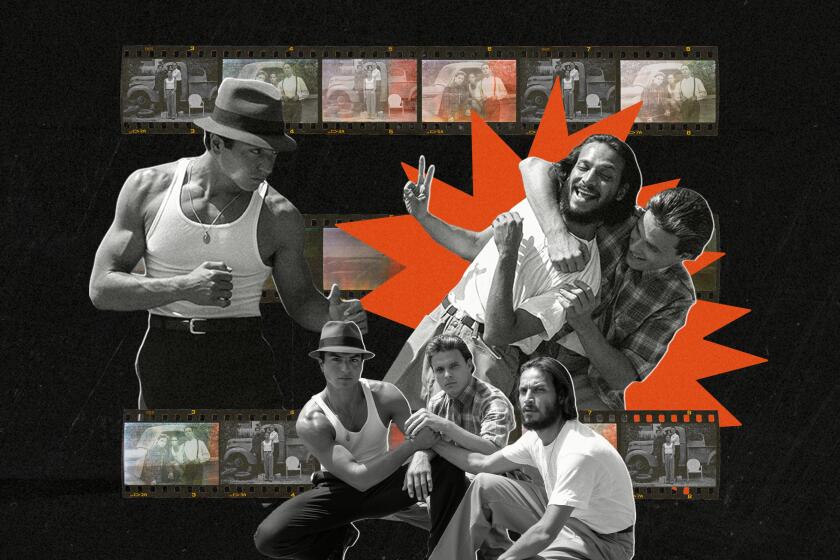Japanese confront history with ‘Iwo Jima’
The Japanese website for Clint Eastwood’s “Letters From Iwo Jima” opens with a pitch to go see a movie about “an island the world must not forget.” But it is the Japanese who have always pushed memories of the terrible battle for that Pacific rock to the recesses of the mind.
Sixty-one years on, there are signs, at last, of a Japanese desire to resurrect the story of those men dispatched into the maw of a superior enemy force and ordered to die for a lost cause. Eastwood’s movie about the battle of Iwo Jima sits atop the box office here after opening Dec. 9 to glowing reviews from Japanese critics, who lauded its sympathetic portrayal of soldiers being sent to almost certain death -- and wondered why it took an American director to tell the story.
“People of my generation did not learn modern history at all in school,” Kazunari Ninomiya, the young Japanese pop star who acts in “Letters,” said after a Tokyo premiere that drew tears from some in the audience. Ninomiya plays Saigo, a baker cynical about the forces of empire that have conscripted him into the fight, driven only to survive to return to his wife and the infant daughter he has never seen.
“I’ve only read a few books [about the war] and thought it was sad and terrible,” he said. “I hope the movie will become an alternative textbook about that period.”
To critics, however, substituting a trip to the cineplex for proper history lessons will teach today’s Japanese only about sacrifices and suffering, without the context of the state-sponsored aggression that led those young soldiers to slaughter.
The same alarm was sounded last year after the release of “Yamato,” a big-budget epic (by Japanese standards) about a Japanese battleship ordered to steam into the invading American armada and blow itself up. That movie, too, was a sad chronicle of young men being sent to certain death with exhortations of national pride ringing in their ears.
“Yamato” was a huge hit in Japan. But many foreign critics worried that showing Japanese sailors fighting bravely was tantamount to glorifying the Japanese cause.
“I knew the dangers of it being misinterpreted,” said Junya Sato, 66, the film’s director, who rejects charges that his movie is jingoistic. Those who don’t see its antiwar message miss the point, he said.
“I made this movie for those Japanese who don’t know anything about the war,” he said. “I wanted to make ordinary people think. It’s easy to be opposed to war -- who isn’t? But I want people to realize they have the power to act so they don’t get led blindly into war.”
The problem is that such sentiments get distorted when seen from outside the country through the prism of current Japanese politics. The country’s leaders are determined to revive a proud national spirit that they claim has been neutered by the legacy of defeat, occupation and American values.
Prime Minister Shinzo Abe, 52, is fond of saying that Japan has left its postwar mind-set behind: He wants a more robust military and an end to the constitutional pacifism introduced under American occupation. Several prominent politicians are calling for a debate on whether Japan needs a nuclear arsenal to defend itself from North Korea, and maybe one day China.
In that environment, movies such as “Yamato” or last year’s science-fiction hit “Laurelei,” in which a rogue Japanese submarine crew saves Tokyo from a fictional third nuclear bomb, are often perceived as harbingers of a new Japanese militarism.
Those worries will only swell next year when a movie written and produced by archly nationalistic Tokyo Gov. Shintaro Ishihara is released. Called “I Will Die Only for You,” the film is an ode to the bravery of the kamikaze pilots who flew to their deaths in a desperate, last-ditch attempt to stave off an American invasion of the main Japanese islands.
Some Japanese media executives don’t even see these latest films as “war movies” at all. To Chihiro Kameyama of Fuji TV’s film division, one of the top producers in Japan, they are love stories or relationship stories merely set against the backdrop of war. Japanese audiences would never come out in big numbers to see the grittier aspects of Japan’s wars, he contends.
“The Japanese are aware of their history as invaders but, in general, are not able to look and face that reality,” he said. “The limit in Japanese war films is to portray a fight to protect loved ones. It’s not a matter of who fought who. It’s what they learn from the experience.”
Yet many here wonder why a subject with the moral thunder of Iwo Jima has never been the subject of a great Japanese movie. Furthermore, Eastwood built “Letters” around the thoughts and actions of Gen. Tadamichi Kuribayashi, an extraordinary figure little known in Japan. Educated at Harvard and well aware of America’s economic and technological superiority, Kuribayashi still devised a brilliant defense of tunnels and traps that turned Iwo Jima into a charnel.
“It’s a Japanese trait to not create heroes,” said Kiyoshi Endoh, head of the Japanese Iwo Jima Veterans Assn., who advised Eastwood on Japanese perspectives of the battle. “Japan was in total devastation after the war, so in understanding for the feelings of those families who lost members, we couldn’t make any movies about heroes.”
It may have taken an American director to lift that taboo. Until now, foreigners have criticized Japan for ignoring the war, while simultaneously criticizing it whenever a movie veered from the agreed narrative that requires every Japanese soldier to be portrayed as the brainwashed bayonet of an evil regime.
Even Eastwood’s movie, were it not made by an American, would likely have been attacked for daring to show the humanity on the Japanese side.
“For 60 years, this has been a war we have tried to forget,” said Yoshitaka Shindo, Kuribayashi’s grandson, now a lawmaker with the governing party. “Of course we knew there was a war and that we lost it. But the only thing we learned was about the tragic deaths of civilians. The rest we put a lid on. We didn’t talk about the details.
“But thanks to this movie, we can learn now, about the good things and the bad things,” he said. “Then, we can go on.”
More to Read
Only good movies
Get the Indie Focus newsletter, Mark Olsen's weekly guide to the world of cinema.
You may occasionally receive promotional content from the Los Angeles Times.






